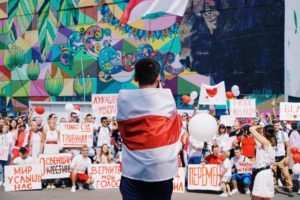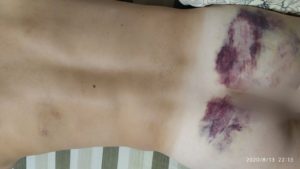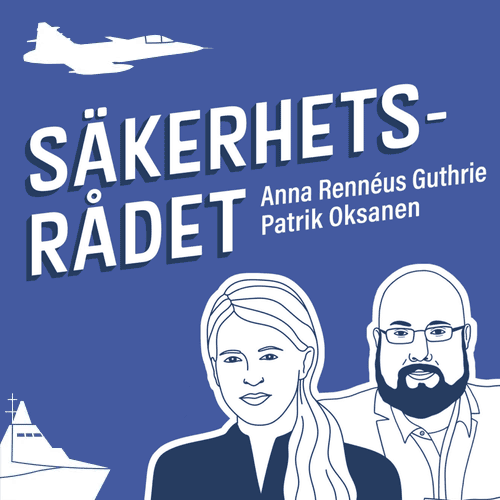This article is part of the Let The World Hear Project, which is a collaboration between Stockholm Free World Forum’s webzine Säkerhetsrådet and a number of Belarusian volunteers. Together we have gathered stories from victims of the dictatorship regime in 2020. The world must know what happened.
Read more about the project here.
This is the story of 36-year-old Maksim* from Minsk. He was detained on 9 august 2020.

Protests in Minsk. Photo: Artem Podrez/Pexels
MB: Tell us about yourself
My name is Maksim, I’m 36, married, and the father of a five year old. My wife and are both employed in the private sector.
MB: Have you been politically active in the past? What prompted you to participate in the protests?
No, never before. However I felt that the time for change has come. I didn’t agree with many aspects of his [Lukashenko] ruling style. And overall, it was not pleasant to see the same person over and over for 26 years.
MB: Tell us how it all started.
It all began in the evening on 9 August [the day of the presidential elections]. My wife and I decided to go for a drive after work, we wanted to support the street protesters. That is, simply to greet them by blowing the horn – a rather passive form of support, so to say.
It was around 9 pm when we got stopped by a police car for what appeared at first a routine check. After showing her license, my wife was asked to follow the patrol officer to his vehicle to ”verify some details”. In the meanwhile, a couple more police cars arrived, several officers got out and stood in a group talking, with their eyes on me. Soon a couple of them headed my way, handcuffed me and threw me into a police car, no explanation given. My wife was still in the other car as we drove off, I did not know until days later what happened to her.
MB: What happened next?
I was taken to Soviet RUVD (ed. note; Regional Department of Internal Affairs). I kept asking where my wife was and why I was detained. No answers. I was taken to a courtyard behind the building. There, I saw a group of 50 or so other detainees. They were stood facing the back wall with arms raised high above the head, palms turned out – a really awkward, uncomfortable position. Some of them were jogging in place. The officers frequently went out into the yard to smoke, joked and laughed. And they saw 50 people standing against the wall, that they were severely beaten for nothing, that they screamed in pain and asked to stop. The officers beat detainees with peculiar ferocity and pleasure. There, in the outdoor courtyard, I spent until about 6 pm next day [almost 24 hours later].
The night turned rather cold, around 8 degrees, and most people were lightly dressed – in shorts, T-shirts. Throughout the night, the police periodically kicked us, smashed with fists and beat with batons. At some point during the night an ”inspector” arrived and forced us to sign detention protocols. Nobody knew what those protocols said – to any questions, the answer was more beatings. So everyone signed.
As time went on, new people kept arriving and more severe beatings followed. The intention was clearly for those sounds to be heard on the outside… the screams of people in pain and batons hitting flesh. Those sounds carried on non-stop for hours.
When someone could not manage to stand so long they were allowed to squat for a bit or to jog in place which brought a sense of relief from numbness and a bit of warmth. We were taken to the toilet when asked, a bit of water was passed around – a two liter bottle to be shared by everyone so each barely has a sip. Beatings escalated if any questions were asked.
One man among us was suffering from asthma and had difficulty breathing. He was asking for medication, which was in his bag during the arrest, and was refused. As his condition deteriorated, the guards finally made a call and an inhaler of some sort was brought in. At this point it was too late for it to help – the man explained he needed an injection. Another 30-40 minutes went by until an ambulance arrived and took him away.
Someone else next to me was refusing to unlock his phone got severely beaten – he did unlock it in the end… These are just episodes happening nearby, I couldn’t see much of what was happening further away – just heard the screams.
All this time [almost 48 hours since the initial police stop] I spent outside and was not taken into the cell at any point. Around 6pm an avtozak (ed. note; wagon for transportation of prisoners) came and loaded people up under constant beating and verbal abuse from the guards. Inside the vehicle there are ”cells” meant to hold one person – they filled each with four. We could barely move in there, breathing was difficult.
In Okrestina jail
It turned out that we were being transported to Okrestina. After exiting the avtozak, we had to go through a ”corridor” of OMON guards (ed.note; a special police force used as either riot police or paramilitary force) lined up on either side. They smashed us with batons on the legs and backs as we walked. The quick ones were ”lucky” and ”only’”got 10-15 hits as they passed through. The ones who fell down were less ”lucky” – the beating continued on the floor, they were ordered to get up and were smashed some more. After we made it to the wall, we were forced to kneel and received more beatings. Another such ”corridor” was formed after some time to take us to the ”cell”.

The aftermath of the beatings. Photo: private
The ”cell” was also outside, it had cement walls and floor and metal bars on top [no roof exists]. We counted 75 people among ourselves in what was a 20-25 square meter space. As not everyone could even sit at the same time we were taking turns to catch some sleep in a squat position, the rest had to stand meanwhile. Water was given only after we begged for it for hours. The toilet? A plastic bucket to share.
I remember an 18 year old guy, who was forced to shout ”I love the riot police” and was beaten so badly that he could hardly move and was completely pale. We asked the guards for an ambulance, and after 30 minutes this guy was taken to the hospital. He was beaten because of the oppositional slogan written on his jacket.
From the prison cell to freedom
Here we spent until next afternoon at which point the guards started to take us upstairs to the actual prison cells. It was much better there – warmth, a toilet and no more beatings. Some people got called to the ”court” – I did not actually make it, but signed a paper instead instructing to appear in court in September. And then I was released.
Outside, I was greeted by a sea of volunteers – offering medical and psychological help, food and drinks, a ride home, a phone charger, to make a phone call… I was touched to tears by their support and kindness. I had some food for the first time since detention, a cup of hot tea, called my wife and sister.
Volunteers gave me a ride home, and later followed up with a call to check on me next day.
MB: How do you see the future of your country?
If nothing changes, I would be looking to leave the country. It was never my intention before – I always wanted to live in Belarus and watch my children grow up here.
As a separate follow-up after the interview, Maksim wanted us to add the following:
I think that the acting president of Belarus is a dictator who is using force to stay in power and to falsify the election results. Under his direct orders ordinary people who want their opinions to be heard are getting detained, beaten and killed.
*Maksim’s real name has been changed for confidentiality purposes.
The story was originally told in Russian to Margareta Barabash and translated by Maria Thompson.
